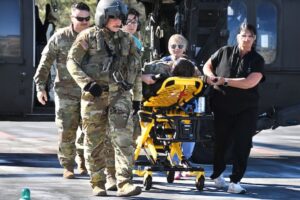
Pictured: Sgt. Lyle Gordon, flight medic, 1st Battalion, 5th Aviation Regiment, Cajun Dustoff; registered nurses Laney McGhee and April Runyon, both assigned to the BJACH Emergency Department; Sgt. 1st Class James Stirling, noncommissioned officer in charge of the Patient-Centered Medical Home; and Pfc. Edson Corvera Salazar, combat medic specialist.
Story by Jean Graves
Bayne-Jones Army Community Hospital
FORT JOHNSON, La. — At Bayne-Jones Army Community Hospital, training isn’t just a requirement-it’s a mission imperative. Supporting the Joint Readiness Training Center and Fort Johnson, BJACH is equipping its medical teams with the skills and confidence needed to deliver world-class care at home and in combat. From aeromedical evacuation drills and emergency department cross-training to hands-on clinical skill refreshers, these training efforts ensure BJACH personnel are ready to save lives anytime, anywhere.
Sgt. 1st Class Chip Allen, noncommissioned officer in charge of the BJACH emergency department, led efforts to ensure all assigned combat medical specialists, or 68Ws, received cross-training in the ED and other clinical areas. This initiative was developed to allow for cross-departmental coverage when needed.
“For our medics, this is important because it increases versatility, competence and flexibility for them to work anywhere in our organization,” he said. “This bolsters the knowledge and manpower utilization of our 68Ws when they move on to other Army units.”
Allen said cross-training improves and supports future operational readiness, enhancing their ability to work in a variety of roles in both combat and clinical settings.
“This endeavor will benefit my department and the hospital by breaking the isolation bubble of working exclusively for an assigned clinic,” he said. “It builds teamwork and confidence in our medical capabilities to learn and grow into the Army’s most versatile MOS, both on and off the battlefield.”
Allen said the Fort Johnson community can be confident knowing that BJACH medics are trained, competent and ready to support patient care wherever they are needed.
Following their emergency department rotation, BJACH medics began cross-training in the hospital’s primary care clinics.
Maj. Tynika Reese, clinical nursing officer in charge of the BJACH emergency department, coordinated aeromedical evacuation hot and cold load training with the 1st Battalion, 5th Aviation Regiment’s “Cajun Dustoff” on March 18 and 20.
Reese said the training was designed to ensure emergency department personnel are prepared for high-pressure situations.
“For many of our civilian staff and new military Soldiers, this may be their first exposure to military medical evacuation operations,” she said. “The training aimed to familiarize everyone with the process, procedures and the importance of teamwork. Effective patient transport relies heavily on clear communication between the flight crews and hospital staff to ensure a smooth handoff and optimal care during critical moments.”
Reese said practicing in real or simulated scenarios enhances readiness, strengthens capabilities and improves staff efficiency.
“The mission of the Joint Readiness Training Center is to deliver realistic training for military units by preparing them for various operational challenges,” she said. “The 1-5 Aviation and the BJACH emergency department play vital roles in this mission by ensuring that Soldiers receive prompt and effective medical care during training exercises. With Cajun Dustoff providing rapid transport from the field to our helipad, we can quickly address injuries and life-threatening conditions.”
Reese added that integrating MEDEVAC operations with hospital care establishes a comprehensive support system that prioritizes Soldiers’ health and readiness.
“This partnership enhances our ability to respond effectively and provide the highest level of care to our patients,” she said.
Training at BJACH isn’t limited to emergency personnel. The Hospital Education and Staff Development team hosted a Skills Fair March 25–27 featuring interactive stations focused on critical individual and clinical skills.
1st Lt. Allysya Moore, a registered nurse assigned to BJACH’s inpatient ward, volunteered to coordinate the event.
“The purpose was to keep staff trained and updated on policies as well as new medical information and procedures,” she said. “Patient safety is our number one priority, and events like this ensure we’re practicing safe, high-quality care.”
Moore said this was her first time planning an event of this scale.
“Nurses were our target audience for this fair, but we wanted it to be of value to everyone in the hospital,” she said.
She took a census of the nursing staff to determine what areas they wanted more training in and included annual training requirements as she coordinated instructors and course topics.
“Each station was designed to reinforce core clinical competencies while giving staff the chance to refresh skills they might not use every day,” she said. “My goal was to make the training both meaningful and applicable to real-world scenarios.”
Moore said participants could sharpen their skills in wound care, blood transfusion protocols, central line maintenance, pain management and perioperative nursing — just to name a few.
She also participated in the hot and cold load training offered by the emergency department.
“I think cross-training in other areas is important,” she said. “I look at organizations like they’re made up of boxes. Each box is a different section, and sometimes we get so focused on what we’re doing in our box that we forget about the other boxes. Working or training with other sections helps us build understanding and organizational synergy.”
Moore said through interdepartmental training and engagement opportunities, communication and efficiency will improve.
With training events like these, BJACH continues to reinforce its commitment to patient safety, operational readiness and high-quality care. Whether on the battlefield or at Fort Johnson, BJACH medical teams stand ready to support Soldiers and Families with expertise, confidence and compassion.